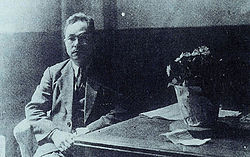Pak Hon-yong
|
|
|
| Korean spelling | |
|---|---|
| Chosŏn'gŭl | 박헌영 |
| Hancha | 朴憲永 |
|
Revised Romanization |
Bak Heon-yeong |
|
McCune- Reischauer |
Pak Hŏnyŏng |
Pak Hon-yong (* 1900 in Sinyang-myeon , Chungcheongnam-do Province , then Korea , now South Korea ; † December 18, 1955 ) was a North Korean politician .
Pak Hon-yong came from a family of the Korean upper class in the southern part of Korea. In 1919 he completed his school education in Keijō .
Pak's political activity began in 1921. In Shanghai he joined the Communist Party of Korea, which was founded there . In April 1922 he was arrested as a communist activist in Chosen Province by the Japanese colonial authorities. In 1924 he was released from prison and subsequently worked as a press journalist for the newspapers Tōa Nippō and Chōsen Nippō .
On April 18, 1925, Pak participated in the founding of the Korean Communist Party and became one of its leaders. Until the end of the following World War II he had to stay in hiding and lived underground.
When the Communist Party in North Korea, which was dissolved in 1928, was re-established in August 1945, Pak was installed as party secretary. In December 1946 he organized the establishment of the South Korean Workers' Party in the part of the country occupied by US troops, today's South Korea , and became its chairman. This later merged with the North Korean Communists to form the Labor Party of Korea (PdAK). Like most of the South Korean communists, Pak also went to the north and was a member of the government of the newly founded North Korea from September 1948 as Foreign Minister and Deputy Prime Minister .
The efforts of North Korean head of state Kim Il-sung to secure his political survival after the lost Korean War and to consolidate his sole rule soon put Pak in a difficult position. Kim Il-sung, who belonged to the faction of the former anti-Japanese partisans within the PdAK, wanted to liquidate the remaining wing of the party. If they did not manage to flee abroad in time, their members were arrested and sentenced under fabricated accusations, disappeared in prison camps or were executed . A second reason for this was that Kim wanted to put the blame for the de facto lost war on someone else. Pak Hon-yong was arrested on August 3, 1953 and two years later, on December 15, 1955, found guilty of espionage for the United States and sentenced to death . The sentence was carried out three days after it was pronounced.
Web links
- claim: Pak Hon-yong being reinstated in DPRK , in: hunjang.blogspot.com July 12, 2006.
- Formation of the Korean Workers' Party , globalsecurity.org.
- North Korean Purges , globalsecurity.org.
swell
| personal data | |
|---|---|
| SURNAME | Pak, Hon-yong |
| BRIEF DESCRIPTION | North Korean politician |
| DATE OF BIRTH | 1900 |
| PLACE OF BIRTH | Sinyang-myeon , Chungcheongnam-do Province , what was then Korea , what is now South Korea |
| DATE OF DEATH | 18th December 1955 |
